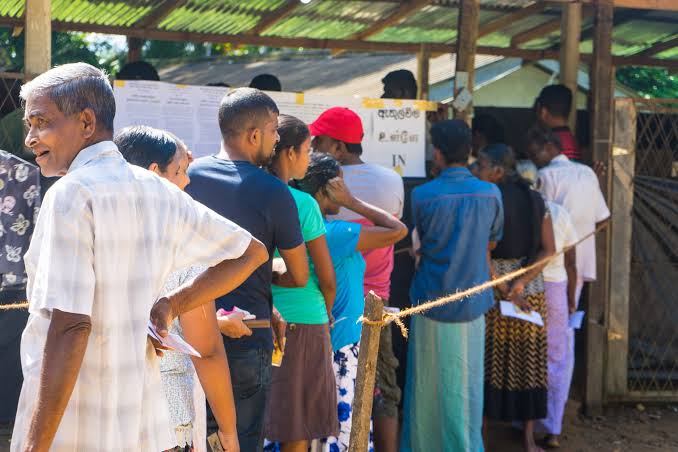Voting in Sri Lanka’s twice-delayed parliamentary elections was, on Wednesday, moving at a slow pace as many elderly people were kept away due to fears of the coronavirus.
SEE ALSO: How Jonathan’s Almajiri reform was sabotaged – Northern rep
According to Elections Commission spokesman, Channa Peiris, voter turnout was less than 40 per cent, five hours into the polling day.
Normally, the number at that point would have been around 50 per cent.
The elections are expected to expand the power of the ruling party amid a weak and divided opposition.
Voting was slowed down due to strict health guidelines that included sanitisation measures, social distancing and compulsory face masks.
Polling was extended by an hour, to 5.00 p.m. (1130 GMT), to accommodate more voters.
Meanwhile, authorities had so far deployed more than 15,000 health officials as well as public health inspectors to assist in making sure safety measures were followed.
However, some elderly Sri Lankans, who were more at risk for severe illness from COVID-19, were kept away from polling sites as a precautionary measure.
Meanwhile, more than 16.2 million people are registered to vote to elect members to the 225-seat parliament for five-year terms.
According to the Election Chairperson, Mahinda Deshapriya, voters’ have been urged to come to the polls as early as possible, because health precautions mean voting will take time.
The elections were delayed twice due to the coronavirus pandemic.
The cost of holding them shot up to 10 billion Sri Lankan rupees (or $54 million), from the usual cost of around 6 billion rupees, due mainly to additional expenses incurred because of the pandemic.
President Gotabaya Rajapaksa and his brother, Prime Minister Mahinda Rajapaksa, who is seeking another term, headed the campaign for the Sri Lanka Podujana Peramuna (Sri Lanka People’s Front).
However, the election was expected to result in the brothers consolidating their power.
President Rajapaksa has urged voters to give his party a two-third majority in parliament, which would allow him greater power to push through an agenda that include amending the constitution.
The president said he could change the constitution to remove certain provisions, for instance regarding the appointment of key officials, which he said were an obstacle to ruling the country.
Rajapaksa has already appointed several former army officers for top civil administration positions.
He was a former military officer, who played a key role as Defence Secretary in defeating the Tamil rebels in 2009, ending a 26-year conflict.
The main opposition, the United National Party led by former Prime Minister Ranil Wickremesinghe, is badly divided.
Most of its previously popular candidates are running under the banner of a separate party, known as the Samagi Jana Balawegaya (United People’s Front) and led by former presidential candidate, Sajith Premadasa.
The counting of the vote has been postponed until Thursday as an additional health precaution for officials and representatives of political parties taking part in the process.
Results, which usually would have been delivered on the day of the elections, will now be released only from Thursday.

